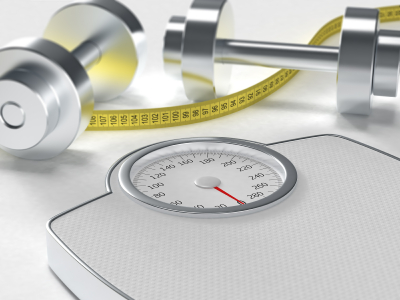
Minor increases in scale weight can make or break the day of someone who is trying to lose weight. There is nothing more demoralizing than a long hard day or week of food logging and working out only to see the scale go up 1 lb, right? Well it shouldn’t be, and here is why!
1. Scales can’t differentiate between good weight and not so good weight (or what we call lean/good mass and fat/bad mass). When starting any exercise program (cardio or weight training), there is an initial gain in lean mass to better handle the increased demands. This can continue throughout the program when training is increased. The scale may say you are up 1 lb but you could be up 4 lbs of lean mass and down 3 lbs of fat. While the scale makes you think you failed miserably, you actually had a GREAT week. Don’t just look at scale weight: take into account how your clothes are fitting and how you appear in the mirror. This is also why assessments are CRITICAL! Schedule one TODAY if you are due 😉
2. Daily changes in water could result in up to 3-5lbs of weight fluctuation. For example, I weigh in at 177-177.5 every morning and about 180-183 in the evening. This is most likely caused by variability in food and fluid intake day to day. For this reason, it is EXTREMELY important to be consistent about WHEN your weigh yourself. As you can see, there is more consistency in the morning; for this reason we recommend weighing yourself in the morning after you go to the bathroom at 1 week intervals.
3. Never listen to the body fat reading on your scale. These scales use an electrical current that is impeded by fat and conducted by lean mass (since it’s mostly water). Variations in hydration status can SIGNIFICANTLY vary the reading. This type of measurement is not valid or reliable unless VERY strict guidelines are followed.
4. Don’t forget that scale weight isn’t all that matters! Read my blog on the many beneficial health adaptations that occur as a result of exercise.
Don’t let the scale be your only guide when embarking on an exercise program, especially at the start! Consistent body composition assessments using skinfolds and circumferences are the best way to track changes. In addition, don’t forget about the health benefits of exercise! Even if you are at a weight plateau, many other beneficial changes continue to occur!
About the Author:
-

Michael Stack is the founder & CEO of Applied Fitness Solutions and Frontline Fitness Pros. He is a faculty lecturer for the University of Michigan’s School of Kinesiology. He is also the creator and the host of the Wellness Paradox Podcast, produced in conjunction with University of Michigan.
Michael is an exercise physiologist by training and a health entrepreneur, health educator, and fitness industry advocate by trade. He is dedicated to enhancing the standard of practice of, and advocating for, fitness and wellness professionals to ensure they become an essential constituent in the healthcare delivery system.
With a career spanning over three decades in fitness, health, and wellness Michael has a deep knowledge of exercise physiology, health/wellness coaching, lifestyle interventions to mitigate chronic disease and leadership. He is credentialed through the American College of Sports Medicine (ACSM) as an Exercise Physiologist (ACSM-EP), Exercise is Medicine practitioner (ASCM-EIM), and a Physical Activity in Public Health Specialist (ACSM-PAPHS). Michael is a National Strength & Conditioning Association (NSCA) Certified Strength & Conditioning Specialist (CSCS), and a CDC Diabetes Prevention Program (DPP) Lifestyle Coach.
Michael received his undergraduate degree from the University of Michigan’s School of Kinesiology in 2004 and is currently a Master’s of Public Health (MPH) candidate at University of Michigan, with a specific concentration in health behavior and health education.
Michael is a board of directors’ member for the Physical Activity Alliance and Michigan Fitness Clubs Association. He sits on the University of Michigan’s School of Kinesiology Alumni Board of Governors. Michael is an expert curriculum reviewer for the American College of Lifestyle Medicine. Finally, he is a member of the executive leadership team for American Heart Association’s Heart Walk.
Michael lectures nationally for several health/fitness certification and continuing educations, including; IHRSA, the Medical Fitness Association, the National Strength & Conditioning Association, and SCW Fitness.
